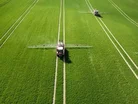Spraying smart: Bosch and Bayer’s Agricultural Revolution

Making the most of available arable land is a must in order to meet the demands of an ever-growing and consuming population. Dr Boris Buchtala, Head of Smart Agriculture at Bosch Corporate Research, discusses the company’s ongoing smart spraying project with crop science expert Bayer
Agriculture is, more than ever, a numbers game. According to the United Nations, farmers need to sustainably generate 50% more yield by 2050 if the world’s population is to be fed.
Around 11% (1.5bn hectares) of the land on earth is used in crop production, roughly a third of the total land perceived to be in some degree suitable for arable farming. However, finding an extra 50% yield is not as simple as farming more land. The uneven spread, quality and potential environmental impact are all factors which lead many commentators to believe there is, in fact, very little or no land left to be cultivated.
What is certain is that existing cropland simply has to be farmed more efficiently. For German multinationals Bosch and Bayer, this means developing and implementing smart agriculture solutions.
Dr Boris Buchtala, Head of Smart Agriculture at Bosch Corporate Research, leads the company’s explorations in smart agriculture. At the heart of a new project with agronomy giant Bayer, he and his team have been pioneering more effective ways of using herbicides, a key requisite for any farming operation to become truly sustainable.
“We have to think about how we can use plant protection technology more efficiently,” Buchtala says. “If we are to solve this issue, then there is a high potential for further innovations in the agriculture sector regarding herbicides, fertilisation and irrigation.”
Creative clout
If any two companies hold the technological and agricultural expertise to transform the concept of smart farming into a reality, it is Bosch and Bayer. Their combined annual revenue of well over US$140bn also means the partnership carries the financial might to make a difference on a global scale.
The current partnership is a three-year agreement that involves the joint development of smart spraying technology which can detect which parts of fields need herbicide application.
“We entered the partnership with Bayer around a year ago and at this time we started to really canvass the views of the farmers and what they wanted from this,” Buchtala adds. “The first components with basic functionality will be delivered next year to pilot customers. It is a quick turnaround, but one we are confident of achieving.”
Buchtala has no hesitation in predicting a rapid uptake of the technology once it appears on the market, with Bosch intending to initially target European, North and South American and Australian markets.
Milliseconds
Once rolled out, the smart spraying technology has the potential to bring the agricultural numbers game up to a whole new level.
From detection to application, the solution works in 300-millisecond cycles. “The first step is to record images with cameras that cover the entire operating range of the sprayer,” Buchtala explains. “The software recognises the different weeds in the crop and automatically selects which herbicide to spray, and which part of the sprayer to spray it from.
SEE ALSO:
- Smart food – how tech is transforming agriculture
- Bosch is building a smart agriculture testing ground in Melbourne
- Hands Free Hectare project set to become world’s first fully automated crop cycle
“Our software analyses the image, including detecting whether a plant is a crop or weed and reading the soil, within about 150 milliseconds, with the spray being applied within another 150 milliseconds. The detection and application is carried out in one step, and this is unique when compared to the alternatives on the market right now.”
The rapid speed of the process means that farmers are able to apply the solution in a single crossing, saving crucial time. “We also foresee large savings potential with this,” Buchtala adds, “although we cannot be pinpoint accurate with targets as this depends on individual compositions of fields and crops.”
Farming smart
Buchtala also emphasises the possible applications of this research beyond smart spraying.
Bosch plans to test wireless data connections with sprayers and other equipment, opening up the potential to assist farmers with efficient planning, control and documentation of plant protection measures.
“We are not only thinking of spraying and reduction of herbicides,” Buchtala says. “This is about wider, more sustainable farming also in fertilisation and irrigation and in conjunction with connected services.”
As a company, Bosch dedicates around half of its research resources to developing solutions geared towards protecting the environment, and Buchtala’s agriculture-focused team forms an integral part of the company’s effort to help build a more sustainable planet with technology.
Indeed, Bosch is playing a timely role in pioneering smart, economically viable solutions for farmers. A recent study by McKinsey Global Institute has found that agriculture has the lowest digital penetration rate of any industry. There are a number of reasons for this hesitancy including difficulty of use and clear evidence of return on investment, something which has been proven beyond doubt in industries such as financial services.
“We have to use available land as efficiently as possible, and it won’t be possible without these sorts of technological developments,” Buchtala says. “Arable land is becoming more and more scarce. We have a growing population which is accumulating more wealth and therefore consuming more, including meat. The direct impact of this is that you need more crops to feed the animals we are eating.”
“I’m not saying we are going to save the world, but we are doing our bit to make it more sustainable.”



